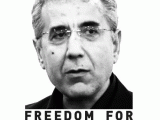The South Caucasus Network of Human Rights Defenders
Intigam Aliyev in court: an observer’s testimony

[02.03.2015]
On Tuesday, 17 February, the Russian lawyer Illarion Vasiliev observed the hearing of the human rights lawyer Intigam Aliyev at the Court of Grave Crimes in Baku, Azerbaijan. The testimony illustrates what a courtroom in Azerbaijan looks like and how justice is conducted against one of the leaders of the Azerbaijani civil society, arrested in August 2014 in the midst of an unprecedented repression against civil society.
Thursday, 19 February 2015, by Illarion Vasiliev, lawyer
Despite the grandiose title of the Court, the courtroom looked shabby. The center of the room was occupied with the huge cage for prisoners. The dimensions of the cage were easy to calculate due to the metal cross wires: it was 6 meters long, 2 meters wide and about 2.5 meters high. It looked monstrous.
The courtroom itself – a dreary, very long though narrow, shabby room with yellow walls and dim lighting. Three judges were sitting at the far end of the room. At the beginning of the room, behind the fencing, there were 12 seats for court attendants – three seats on each bench. The Court attendants were numerous, and at first the Court officer did not even admit me to the courtroom saying that there were no vacant seats there. However, eventually a seat for me was found. I was sitting as the fourth attendant on the bench for three. The bench for the trial participants was on the left: the victims, the accused Intigam Aliyev, and the lawyers.
An accused and a cage
Intigam Aliyev at the Court of Grave Crimes in Baku, Azerbaijan (16 January 2015). © http://freeintigamaliyev.com/2015/01/16/the-hearing-of-intigam-aliyev-postponed-until-23-january/
Intigam Aliyev looked unperturbed and elegant in his grey suit. During the previous court sessions, he was sitting in the cage, but owing to his lawyer’s motion, the Court allowed him sitting outside the cage, and that time he was sitting opposite the cage, with his lawyers and guards surrounding him. The lawyers were sitting closer to Intigam Aliyev, and it looked as if they were also guarded. But at least he was not in the cage anymore.
They say that it is the judge who presides the Court – do not believe it. It was the cage that was presiding at that courtroom. The cage occupies the centre of the courtroom, forcing all the interior space and all the people somewhere out of the courtroom. The impression was still stronger as the shutters on all the five windows were closed tightly despite the dim lighting in the courtroom.
The panel of three judges brightened the shabbiness of the courtroom. The Prosecutor was wearing uniform. Naturally, the court session cannot be conducted without a court clerk, but I was not even sure if there was one present, as the cage would hide both the clerk and the judges. I was not even sure at first if there was the third judge there, but I saw him later when he was coming back from the jury room during the afternoon part of the court session. Later, somewhere there, behind the cage, in the wilds and woods, the so-called victim was also questioned. When she was interviewed we could not see her properly.
Judges in black robes and guards in caps
The judges were sitting in chic black robes with wide-open collars trimmed with black fur. It seemed to me that they had fur cuffs too. At the distance of 15 meters, their mantles looked like expensive winter coats. During the court session, the presiding judge would argue with the defense very emotionally. The judges lacked fur hats to make the overall oriental flavor complete.
Instead, the guards were wearing the caps. It seemed that the guards in the courtroom included all kinds of judicial troops. There were three military men there in green camouflage uniform, with caps and guns, and at least three guards wearing the special black uniform and black berets. The military men had guns in the holsters. There were also three officers wearing blue uniform; I did not notice them to have weapons. There were also some people present wearing civilian black jackets, but, apparently also security. The latter were the strictest ones; they took phones and passports from all the court attendants. They took my camera. They returned all our possessions after the court session.
Defense trying to defend Intigam Aliyev
The court session started with a series of motions submitted by the defense, which took the first part of the day before the lunch break and some time in the afternoon. The defense requested to remove arrest from the office and return the office equipment, and to interview a number of witnesses. After the lunch break, the prosecutor spoke about the arguments of the motions calling them “artificial” and an attempt to drag out the process. He was speaking glibly, beautifully and theatrically. Well, after all, he provided a pleasant impression. The judges retired to deliberate, which did not take them long, just a couple of minutes. They denied all the motions.
Accusations against Intigam Aliyev
Then the Court interviewed the victim – Intigam Aliyev’s accountant. She said that he had forced her to open a bank account for her sister and to transfer 119,025 manats to that account. Then he made her maintain double-entry bookkeeping, make “grey” wage sheets. Our interpreter would call her “the victim.” But I kept wondering whether I failed to understand all the intricacies of the Azerbaijani trail, or the intricacies of the Azerbaijani language: As for the trial, in the public prosecution cases, including tax crimes, it is the State who is the only victim, is it not? And as for the language, in my opinion, an accountant like that should be called “a party to the crime”, if crime there is and if there was another party. Or would it be correct to call her “an agent”? What indeed is the harm that she suffered?
It turned out that she had suffered right before she was fired. She had a dispute with Intigam Aliyev about her salary and she quit believing that she had been underpaid 240 manats. In view of that fact, the defense tried to disallow the prosecutor’s questions, apart from those referring to that very non-payment. The prosecutor objected and insisted on his questions, and the judge started a vigorous debate with the defense.
Having heard the “victim,” the Court closed the session and adjourned the hearings for 3 March 2015. The court session ended with a thunderous applause from the audience cheering Intigam Aliyev.
Calendar
Archive
|
||||||||||||||||||||||||||||||||||||||||||
|


